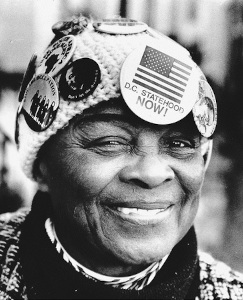Josephine Butler (activist) facts for kids
Quick facts for kids
Josephine Butler
|
|
|---|---|
 |
|
| Born | January 24, 1920 Brandywine, Maryland, U.S.
|
| Died | March 29, 1997 (aged 77) Washington, D.C., U.S.
|
| Education | Strayer University |
| Occupation | Activist |
| Spouse(s) | Jack Brown |
Josephine Dorothy Butler (born January 24, 1920 – died March 29, 1997) was an amazing American activist. She worked hard to make things better for people. She even helped start the D.C. Statehood Party and led it for a while.
Contents
Josephine Butler's Early Life
Josephine Butler was born in Brandywine, Maryland, on January 24, 1920. She was one of nine children. Her parents, Joseph and Helen Arabelle Jenifer, were African-American tobacco farmers. They were called sharecroppers, which meant they farmed land owned by someone else and shared their crops with the owner.
Josephine and other students first went to school in small, simple buildings in the woods. Later, they could attend the new Frederick Douglass High School in Upper Marlboro, Maryland. Some local white people did not want Black children to get an education. They would throw stones at school buses and threaten parents.
Josephine remembered that these people thought, "If we got more education we would go to the city and get better jobs." This would mean fewer workers for their farms. Because Josephine went to school, her father lost work. Her mother then had to work in Washington, D.C., as a live-in helper in someone's home. Josephine later went to Strayer University.
Becoming an Activist
In 1934, when she was just 14, Josephine moved to Washington, D.C. She lied about her age to get a job as a laundress. Her husband, Jack Brown, was a worker who carried bricks. Both Josephine and Jack started organizing workers in their jobs. Josephine even created the first union for Black women laundry workers.
In the late 1930s, Josephine heard famous people like Paul Robeson and Henry A. Wallace speak. She said it felt "like an awakening." This experience made her want to do more to help people.
Working for Change
In the 1940s, Josephine worked in government cafeterias. She helped organize the cafeteria workers there. Later, she became a clerk at the U.S. Veterans Administration. However, in 1949, she was suddenly let go from her job. This was part of a time when the government was checking people's loyalty. Josephine later found out she was put on a list that made it hard for her to get other government jobs. This was called being blacklisted.
Josephine faced a tough time in the late 1950s and early 1960s when she became very sick with a kidney illness. After she got better, she started volunteering with the District of Columbia Lung Association. They later hired her to create educational programs for school children.
In 1967, Josephine organized her co-workers at the Lung Association. They formed a union called Local 2 of the Office and Professional Employees International Union. This made their workplace the first lung association to have a union. She retired around 1980.
Political Involvement
Josephine became very active as a volunteer with the local Democratic Party. She even led District 15 for the party.
In 1971, she helped create the D.C. Statehood Party. This party wanted Washington, D.C., to become a state. Josephine ran for the D.C. City Council as a candidate for this party in 1974 and 1976.
Protecting Parks
Josephine was also a co-chair of Friends of Meridian Hill. This group worked to fix up Meridian Hill Park in northwest D.C. In 1994, she introduced President Bill Clinton when he gave an Earth Day speech in the park. President Clinton later gave Josephine the National Partnership-Leadership Award for her efforts.
The next year, she organized a big Earth Day parade. About 4,000 people marched to the United States Capitol. There, Josephine spoke to a crowd of 250,000 people.
Personal Life
Josephine married Jack Brown. They later divorced, and she began using the last name Butler.
Death
Josephine Butler passed away at Medlink Hospital in Washington, D.C., on March 29, 1997.
Legacy
A place called the Josephine Butler Parks Center was named to honor her life and all the important work she did.

